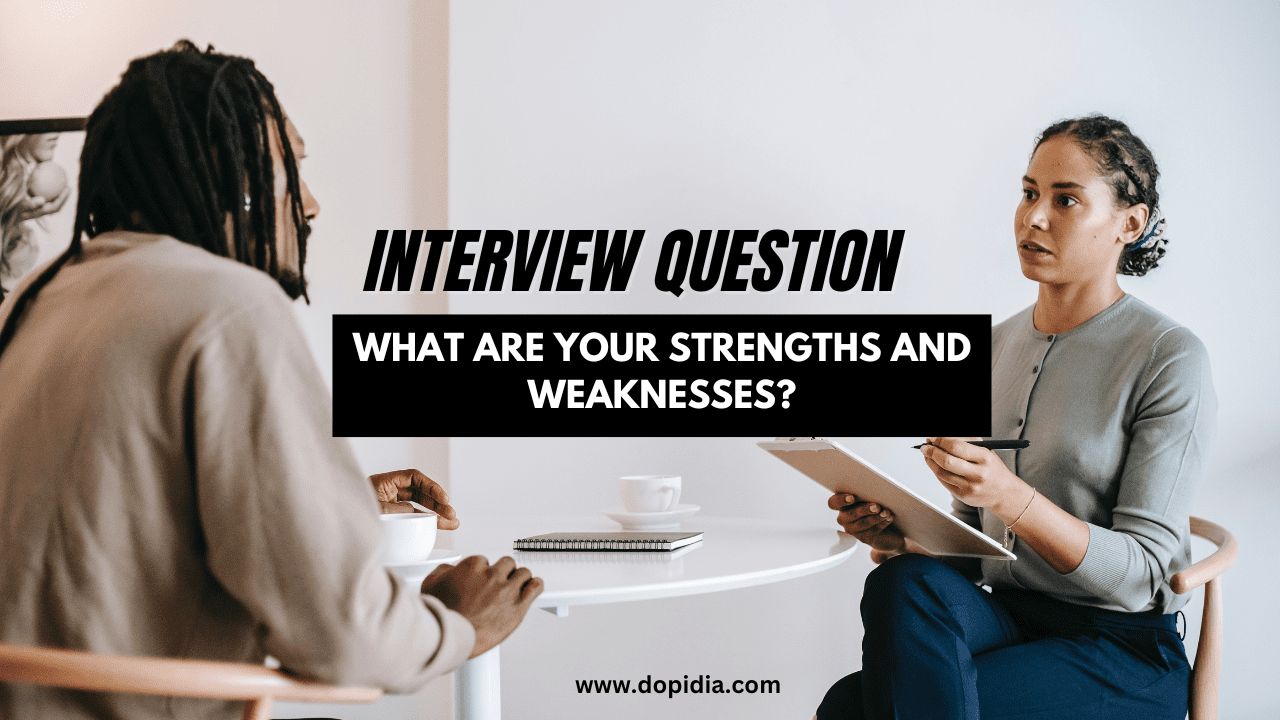Interview Question: What are your Strengths and Weaknesses?
At some point during the interview process, you may be asked to describe your strengths and weaknesses. Many job candidates are unsure of how to handle this question. However, if you put it in the right context, it becomes easier to provide recruiting managers with a sincere and thoughtful answer that highlights both your self-awareness and professional expertise.
A good way to use the time leading up to the interview is to prepare for this question. You may not receive a direct question about your strengths and weaknesses, but by outlining a response to this common question, you can also provide an honest and intriguing description of what you bring to the table and how you intend to continue growing. Once you have clarity on these talking points, you can respond to many common interview questions with greater confidence.
What are Your Biggest Weaknesses
Examples of answers You may be asked about your strengths and weaknesses in one single question, or the interviewer may ask two separate questions. If asked about strengths and weaknesses together, address your weaknesses first so that you can end on a positive note.
When discussing your weaknesses, use examples related to either competencies/habits or characteristics. You may want to choose which ones to focus on based on the type of job you are being interviewed for. For technical roles, it may be very relevant to discuss a specific skill or habit. For sales or customer service roles, the interviewer may be more interested in hearing about your personal characteristics. But there is no definite right or wrong. Review the job description again and see if you can find clues as to what matters most for the specific role.
There’s a simple formula for your answer: bring up your weakness first. Then, provide more context and a specific example or story of how this trait has manifested in your professional life. This context helps potential employers understand how far you’ve come in terms of self-awareness and how committed you are to your professional development.
In the example responses below, the weakness is stated first, followed by a description of the context in italics:
Example 1 : Self-Critical
I can be overly self-critical. A pattern I’ve noticed throughout my career is that I often feel like I could have done more, even if objectively, I did well. Earlier in my career, this led to feelings of exhaustion and negativity. One solution I’ve employed over the past three years is actively working on taking breaks and celebrating my successes. This has not only helped improve my self-esteem but also allowed me to appreciate my team and other support systems in a whole new way.”
Example 2 : Lack of Self-Confidence
I am a shy person. During high school and my early years in the workforce, it hindered me from speaking in public. When I was part of a team that failed to meet its strategic goals for two quarters in a row, I felt obligated to openly share my ideas. I took an improvisation course, which was enjoyable and helped me tremendously in overcoming my shyness. I learned the practical side of leading discussions and capturing different perspectives. Now, in group settings, I initiate conversations with those who are quiet. I know exactly how it feels, and many people have a lot to say once they get started.
Example 3 : Difficulty Asking Questions
I tend to believe I can solve all problems on my own. While it works well in some situations, in many cases, I know I need others’ help to handle things beyond my control. On one occasion last year, I was in charge of a customer event with a very dynamic agenda. It wasn’t until afterward that I realized how close everything came to going wrong. I tried to handle everything, from the strategic level down to the tiniest details, even the seating arrangement. I thought about it a lot afterward. Since then, I’ve worked extensively on considering which individuals or groups can assist before diving into problem-solving.”
Example 4 : Lack of Experience
I haven’t familiarized myself with the latest version of [insert name of non-critical software]. Instead, I focused on [insert name of software you prefer] as user-centric design has become one of my major interests. In my recent jobs, this is where I’ve spent most of my learning and development time.
Example 5 : Procrastination
I have always been someone who procrastinates. I used to think it wasn’t a big deal because the stress only affected me. However, when I worked for company XYZ a few years ago, I participated in a project where I saw how my habit of putting everything off until the last minute created stress for everyone else in the group. It was an eye-opener for me. I started scheduling my day with visible checklists that the team could see, and it helped me break the habit. It was challenging at first, but this process really changed both my work approach and my mindset.”
Example 6 : Perfectionism
I have a perfectionistic side and can get overly absorbed in the details of a project, leaving little time for other tasks. Early in my career, when I worked for company ABC, there was a situation where I almost missed a deadline. I spent so much time on the details that my boss became stressed about not receiving my contributions on time. I learned the lesson the hard way, but it was also a positive experience. Now, I always consider how my actions affect both the team and management. I’ve found the balance between striving for perfection versus doing excellent work on time.
Example 7 : Difficulties in a Specific Area of Expertise
Mathematics was not my strongest subject in school. Frankly, as a student, I didn’t see how it would be useful as an adult. After a few years in the workforce, though, I realized I wanted to work more with analysis. At first, I didn’t know where to start, but I found some free online courses that allowed me to refresh the essential basics. In my latest job, this newfound confidence has helped me set and follow my own goals. Overcoming the math anxiety I felt when I was younger has been extremely beneficial to my self-esteem.”
You should, of course, tailor the above examples to your own weaknesses and how you compensate for and address them.
List of Examples of Weaknesses
We all have weaknesses but are often reluctant to admit them. Therefore, it’s best to start with an honest answer and then build your reasoning from there. Choose something that a hiring manager does not consider a critical attribute or skill for the position and qualities that you actively work on improving.
Here are some examples of weaknesses:
- Organization Council
- Self-critical/sensitive
- Perfectionism (note that this can be a strength in many roles, so make sure you have an example of why perfectionism can be a problem so you show you’ve given this quality proper thought)
- Shy/not used to public speaking
- Competitive (note that like perfectionism this can also be a strength)
- Limited experience in a non-essential competence (especially if this is clearly stated in your CV)
- Not good at delegating
- Taking on too much responsibility
- Not detail oriented/too detail oriented
- Not willing to take risks
- Too focused/unfocused
Related Topic: Best-Paying Jobs in Oil & Gas Production
What are Your Greatest Strengths?
It’s surprisingly difficult for many people to talk about their strengths during an interview. Finding the right balance between humility and the need to demonstrate confidence can be challenging. Just like with weaknesses, you can choose between skills/habits and qualities.
Use the job description as a guide when selecting your strengths. Follow the same formula for strength + context and storytelling. By putting your strengths into context, you highlight specific qualities that make you qualified for the job and help you stand out among the candidates.
Here are some examples:
Example 1. Strong Point : Leadership Skills
I have always been a natural leader. With over 10 years of experience in finance and sales, I have consistently exceeded my targets every quarter and have been promoted twice in the last five years. Looking back at these achievements, I know I wouldn’t have accomplished them if I hadn’t built and led teams with individuals of diverse backgrounds and great expertise. I take pride in my ability to align groups with different functions towards a common goal. I have honed my leadership skills through 360-degree reviews and candid discussions with the team, and I am eager to further develop them in my next role.”
Example 2. Strong Point : Collaboration Ability
I am highly collaborative and have always preferred working in a team. The project teams I have led consisted of various people who are motivated by different creative tasks. The productivity of my current team has increased by 15 percent since I joined, and employee retention has risen by 25 percent over three years.”
Example 3. Strong Point : Social Competence
I am an empathetic person who excels at connecting with people and listening to them. One memorable instance was earlier this year when I was in a support call with a customer whose contract had expired. Renewing the service agreement would have involved a substantial fee increase for the customer.
Understandably, she was upset and felt trapped as she couldn’t be without car insurance for herself and her family. It quickly became apparent that we couldn’t meet her needs, but I wanted her to leave with a positive impression of our service. I discussed some alternative options and even provided tips on other providers who might offer a lower rate so she wouldn’t have a coverage gap. When I received feedback on that call, she specifically mentioned that she would continue recommending our services to others. Throughout my customer service career, I’ve encountered many such complex situations where the customer still retains a positive feeling.
Example 4. Strong Point : Technical Expertise (software)
“I am completely immersed in the latest version of [insert name of new software]. We started exploring all its features right after its release. I feel great enthusiasm about using what I find enjoyable and capable in this position, and pushing the boundaries of what is possible to achieve with this program at your company.”
Example 5. Strong Point : Technical Expertise (writing skills)
“I am highly skilled in writing. I have worked as a copywriter for eight years across multiple industries, and I am committed to being both creative and delivering high-quality work. Learned to strike the right balance between creativity and analytical ability, and I am passionate about showing that excellent writing can yield positive financial results, both in advertising and beyond.”
Example 6. Strong Point : Perseverance
I am both thorough and persistent. When working on a project, I have a grasp of all the details. Understanding all the components involved allows me to filter out the essential aspects and ensure they are prioritized to meet deadlines. This is something that is often reflected in feedback from my colleagues and supervisors.”
Example 7. Strong Point : Organizational Ability
I never miss a deadline. I am highly organized and use my natural ability to organize both people and projects in all aspects of my work. During my seven years as a project manager, I have only experienced a single delayed product launch. In light of that experience, which happened three years ago, I learned an important lesson about trade-offs. I invested a lot of time in meeting a specific design need, and it caused everything else to be pushed back. I wouldn’t want to be without that experience, and I understand how crucial it is to inform stakeholders about emerging issues.
Just like with the examples of weaknesses, you must tailor your choice of strengths and responses based on your experience and competencies. When crafting your script, you can also benefit from the following tips:
- Avoid listing numerous and vague strengths. Focus on one or two crucial qualities directly related to the role and clarify them with specific and relevant examples.
- Avoid making jokes.
- Don’t be arrogant, exaggerate your strengths, or lie about your abilities.
- Avoid being overly humble or underestimating yourself.
List of Examples of Strengths:
- Action-oriented/resourceful
- Attentive/detail-oriented
- Collaborative
- Committed/dedicated
- Creative
- Decisive
- Disciplined/focused
- Empathetic
- Enthusiastic/passionate/ambitious
- Flexible/versatile
- Honest
- Innovative
- Patient
- Respectful
Remember the following key points when preparing your answer to the interview question, “What are your strengths and weaknesses?”:
- Ensure your strengths are aligned with the job description and make you stand out as a candidate.
- Avoid being overly humble.
- Provide concrete answers.
This is often one of the most feared interview questions, but when you take the time to prepare a thoughtful response, you can create a unique story about who you are and where you are heading. When preparing your answers, try to reframe weaknesses as challenges you have taken on and strengths as reasons why you are a good fit for the job.



